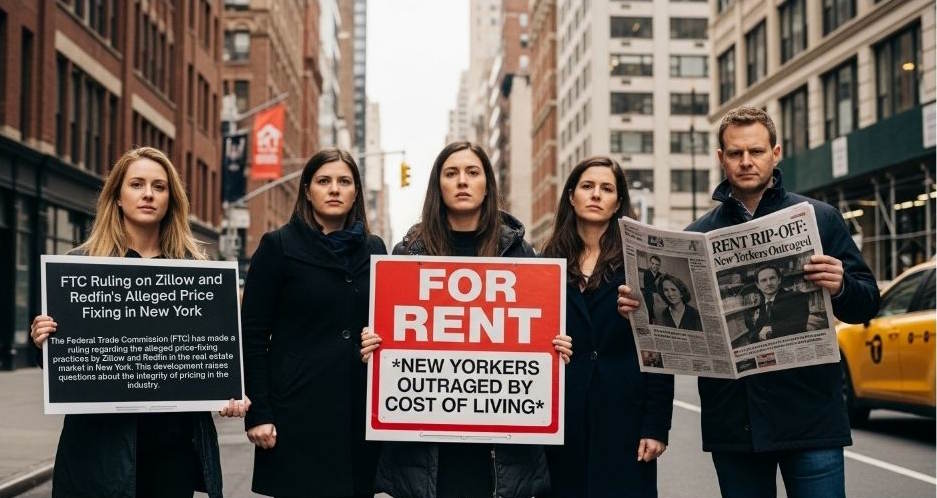The NYC Housing Hunt: A Perfect Storm of Scarcity, High Costs, and Alleged Antitrust Violations
By Rajiv Jadhav
NEW YORK (Oct. 1, 2025) — The Federal Trade Commission and five state attorneys general, including New York’s, have filed lawsuits against real estate giants Zillow and Redfin, alleging the companies illegally conspired to eliminate competition in the online rental listings market that millions of Americans, including New York City residents, rely on to find housing.
As a long-time New Yorker who has navigated both the rental and resale markets in every borough, I want you to know something first: You are not imagining how difficult this is.
Halloween is just around the corner, and the trick-or-treat seems more like a shell game with the American Dream. The struggle to find affordable housing in New York City is a unique kind of hardship, a perfect storm of immense demand, limited space and a cost of living that seems to climb faster than a walk-up tenement.
If you are reading this, chances are you have felt it: that sinking feeling in your stomach after refreshing a listing site for the hundredth time, only to see the same shoebox studio with a jaw-dropping price tag—90 days on market, though.
For generations, New York’s housing market has been a battlefield. A decent one-bedroom that does not require a six-figure salary feels like a myth. A competitive offer on a condo often means waiving contingencies. The “affordable” lotteries have lines that stretch for city blocks. We have grown accustomed to this relentless pace, but recently, a new layer of complexity has emerged.
This brings me to the core of the recent lawsuits. The federal and state complaints allege Zillow paid Redfin $100 million in February 2025 to essentially dismantle Redfin as an independent competitor in the advertising market for multifamily rental properties.
“Zillow paid millions of dollars to eliminate Redfin as an independent competitor in an already concentrated advertising market — one that’s critical for renters, property managers, and the health of the overall U.S. housing market,” Daniel Guarnera, director of the FTC’s Bureau of Competition, said in a statement accompanying the Sept. 30 federal complaint.
Now, you might think, “I’m a renter, how does this affect me?” The connection is direct and deeply troubling. The FTC alleges that Redfin agreed to stop competing in the advertising market for large apartment buildings for up to nine years, becoming merely an exclusive syndicator of Zillow’s listings on its own sites.
For New York City residents navigating an already challenging housing market with record-high costs, the allegations add another layer of concern to the apartment search process. Housing advocates and regulators argue that reduced competition in online rental advertising could drive up costs for property managers to advertise vacancies, expenses that would then likely be passed on to tenants through higher rents.
For years, we have trusted these tech-forward platforms to give us a transparent view of the market. To learn they are allegedly engaged in the very same backroom dealings that make the market so opaque is a profound betrayal. The allegations suggest that while New Yorkers diligently save for a security deposit or a down payment, powerful players may be working in the background to ensure that goalpost keeps moving further away.
This is not just about corporate misconduct; it is about the single parent in Queens spending half their income on rent. It is about the young couple in Brooklyn whose dream of ownership feels perpetually out of reach. When housing becomes unaffordable, people delay getting married, starting families and building lives. It is about the integrity of the search itself.
The FTC’s complaint also alleges Redfin fired hundreds of employees linked to its rental business following the agreement and then collaborated with Zillow to rehire some of them. The agency is asking the court to end the agreement and consider a potential divestiture of assets to restore competition. Both Zillow and Redfin have strongly disputed the allegations, with spokespersons for both companies calling the agreement pro-consumer.
“For generations, New York’s housing market has been a battlefield,” I have often said. “New Yorkers are resilient — we navigate walk-ups, broker fees, bidding wars. What we can’t accept is a system where the platforms meant to help us are allegedly working against us.”
So, what can you do? Stay informed. This lawsuit is a crucial step toward accountability. In this complex climate, having a dedicated, local expert in your corner is more critical than ever. We are not just opening doors; we are helping you navigate a system that, at times, seems rigged against you. Your dream of a New York home is valid, and together, we will keep fighting for it.
If you have stories or news tips Please contact via text : (917) 908-1622
Sources
- Federal Trade Commission. “FTC Sues Zillow and Redfin Over Illegal Agreement to Suppress Rental Advertising Competition.” Press release, Sept. 30, 2025.
- Cited for: Date of federal lawsuit, FTC Director of Bureau of Competition quote, and core allegation of a paid agreement to eliminate competition.
- RISMedia. “Five States Join FTC in Suing to Block Zillow-Redfin Deal.” Oct. 1, 2025.
- Cited for: Confirmation of the five-state lawsuit filed Oct. 1, description of the deal as an illegal buyout, and attorneys general’s description of the market as “highly concentrated.”
- CNN Business. “FTC claims Zillow paid Redfin $100 million to dominate online rental listings.” Sept. 30, 2025.
- Cited for: Specific amount of payment ($100 million) and Zillow’s alleged goal of dominating online rental listings.
- CNBC. “FTC sues Zillow and Redfin, alleging antitrust violation in online rental listings.” Sept. 30, 2025.
- Cited for: Nature of the legal action (antitrust violation) and the market affected (online rental listings).
- Rsquare Media (Original content for commentary and quotes from Rajiv Jadhav).
- Cited for: Quotes and commentary regarding the impact on New York City residents, housing market frustration, and the personal context of the author.

